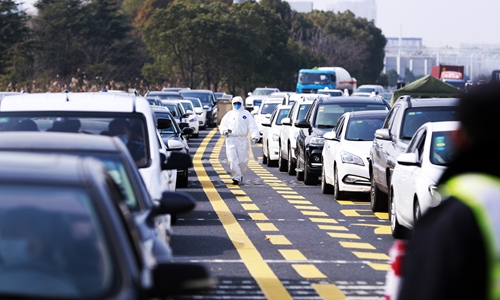HOME >> CHINA
16 people punished for releasing COVID-19 patient from Wuhan to Beijing
By Liu Caiyu and Leng Shumei Source:Global Times Published: 2020/3/2 18:48:40
Central authorities slam serious incident caused by dereliction of duty

Vehicles line up for inspection at a public security checkpoint on the Shanghai-Chongqing expressway. The Shanghai government has introduced a range of measures seeking to contain the spread of the virus as people return to the city from their Spring Festival holidays. Under the measures, every vehicle and person must be checked. Photo: cnsphotos
A case involving a COVID-19 patient who managed to leave Wuhan despite the city lockdown amid the epidemic and arrive in Beijing was a "serious incident caused by dereliction of duty," Chinese authorities said after a thorough investigation, leading to the punishment of at least 16 people from both Beijing and Hubei Province.It was a serious incident caused by dereliction of duty, of a bad nature and had an extremely bad impact, which posed a huge risk to the capital city's epidemic control and prevention work, according to an announcement on Monday by the investigation team led by the Ministry of Justice.
The central investigation team blamed the Hubei Provincial Department of Justice and Provincial Bureau of Prisons for their slack management as the root cause for the case of the person surnamed Huang. Nine people in Hubei, including the Hubei Provincial Justice Department Party committee secretary Tan Xianzhen, were put under investigation.
The Hubei Provincial Bureau of Prisons reshuffled its leadership on Monday. Three officials from the bureau were removed from their posts, including the head and deputy head of the bureau.
The Wuhan Woman's Prison which released Huang without approval and the public security bureau of Dongxihu district in Wuhan were also criticized for slack management and for sending Huang to the highway entry point for Beijing in a police vehicle.
The Ministry of Justice said the incident taught a great lesson for the prison system nationwide, announcing it has arranged staff to check surveillance cameras on a daily basis in an attempt to inspect the risk of the epidemic spreading from prisons. All convicts should undergo a 14-day quarantine before they are released.
Huang, a just released prisoner and COVID-19 patient, was found in a residential community in Beijing's Dongcheng district after arriving from Wuhan last week, sparking widespread concern over how she managed to leave the city amid the lockdown, as the central government had repeated that channels into and out of Wuhan must be strictly controlled.
Loopholes also existed in the work being done at Beijing entry checkpoints, communities and Beijing's center of disease prevention and control (Beijing CDC). Two officials from the Beijing CDC were admonished, according to the Beijing municipal government on Monday.
Beijing's Dongcheng Public Security Bureau is also investigating whether the incident constituted a crime.
Huang was a civil servant and was sentenced to 10 years in prison in 2014 by a court in Hubei for corruption. During her prison term, she was given two commutations totaling 14 months. She was released on February 17, 2020.
According to the central investigation team, the department of justice in Hubei did not thoroughly understand the central government's requirements, their work had just been for show and they did not hand in documents from the bureau of prisons to the provincial Party committee for approval.
Furthermore, they did not correct local prisons' actions after the committee issued a clear guidance, leading to problems in the process of policy implementation in the prison system, which resulted in going against the nation's measures to combat the epidemic.
The provincial bureau of prisons relaxed its management, seriously lacked political and legal consciousness, and ignored the provincial Party committee and provincial department of justice's requirements.
Officials at all levels should have a big-picture vision for the situation of China's epidemic fight, as one person's mistake could cause wide impact, Zhuang Deshui, a professor at Peking University, told the Global Times.
Ren Jianming, an expert in public management at the Beihang University in Beijing, noted that the problems of formalism and bureaucracy
Huang should have been placed under medical quarantine at the Wuhan Women's Prison for another 14 days on February 17 when she completed her prison term. But following frequent requests from Huang's family, prison police officers drove her to a Wuhan highway toll station in a police car and released her there on February 21.
At the toll station, an officer guarding the checkpoint released her right away, failing to perform his investigation and control duties. The officer checked Huang's and the driver's body temperatures, which were normal at that time, as well as their identification, and then let them go.
The residential community in Beijing also failed to stop Huang's vehicle to register and check her information and body temperatures, as the vehicle passed the entry too quickly when arriving at 2 am on February 22.
The driver who brought Huang back to Beijing, surnamed Yang, had called Beijing CDC on February 19, who told him that as long as Huang was able to leave Wuhan, she would not be restricted from entering Beijing, which goes against the capital's policies.
The Beijing municipal health commission asked the Beijing CDC to strengthen its rectification and effectively communicate with grassroots personnel working on the front line in accordance with the deployment of the Beijing epidemic prevention leading group.
Posted in: SOCIETY